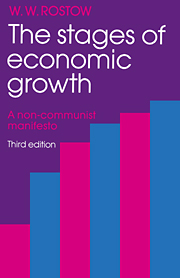Book contents
- Frontmatter
- Contents
- Preface to the Third Edition
- Preface to the Second Edition
- Preface to the First Edition
- 1 INTRODUCTION
- 2 THE FIVE STAGES-OF-GROWTH—A SUMMARY
- 3 THE PRECONDITIONS FOR TAKE-OFF
- 4 THE TAKE-OFF
- 5 THE DRIVE TO MATURITY
- 6 THE AGE OF HIGH MASS-CONSUMPTION
- 7 RUSSIAN AND AMERICAN GROWTH
- 8 RELATIVE STAGES-OF-GROWTH AND AGGRESSION
- 9 THE RELATIVE STAGES-OF-GROWTH AND THE PROBLEM OF PEACE
- 10 MARXISM, COMMUNISM, AND THE STAGES-OF-GROWTH
- Appendix A THE DIFFUSION OF THE PRIVATE AUTOMOBILE
- Appendix B THE CRITICS AND THE EVIDENCE
- Coda: REFLECTIONS ON THE DEBATE AS OF 1990
- Acknowledgments
- Index
8 - RELATIVE STAGES-OF-GROWTH AND AGGRESSION
Published online by Cambridge University Press: 05 June 2012
- Frontmatter
- Contents
- Preface to the Third Edition
- Preface to the Second Edition
- Preface to the First Edition
- 1 INTRODUCTION
- 2 THE FIVE STAGES-OF-GROWTH—A SUMMARY
- 3 THE PRECONDITIONS FOR TAKE-OFF
- 4 THE TAKE-OFF
- 5 THE DRIVE TO MATURITY
- 6 THE AGE OF HIGH MASS-CONSUMPTION
- 7 RUSSIAN AND AMERICAN GROWTH
- 8 RELATIVE STAGES-OF-GROWTH AND AGGRESSION
- 9 THE RELATIVE STAGES-OF-GROWTH AND THE PROBLEM OF PEACE
- 10 MARXISM, COMMUNISM, AND THE STAGES-OF-GROWTH
- Appendix A THE DIFFUSION OF THE PRIVATE AUTOMOBILE
- Appendix B THE CRITICS AND THE EVIDENCE
- Coda: REFLECTIONS ON THE DEBATE AS OF 1990
- Acknowledgments
- Index
Summary
WAR IN MODERN HISTORY
In this chapter we turn to the problem of war. Indeed, it cannot be evaded in a system of thought designed to make some kind of order of the transition from traditional to modern societies. For the progression we have considered thus far—from traditional societies to societies of high mass-consumption—has, as a matter of simple historical fact, been shot through with violence organized on a national basis. Men and the societies they have constructed have not climbed smoothly up the stages-of-growth, once the world of modern science was understood and began to be applied. They did not create, unfold and diffuse the layers of technology and let consumers' sovereignty and its income- and price-elasticities of demand determine the contours of growth. War has drawn resources, shattered or altered societies, and changed the options open to men and to the societies of which they were a part.
Quite aside from the brute historical fact of armed conflict there are three quite particular reasons why this book must deal with the problem of war.
First, the theory of the preconditions period—of the undoing of the traditional society and its supplanting with one form or another of modern society—hinges substantially on the demonstration effect of the relation between modernization and military power.
Second, if this system is to challenge and supplant Marxism as a way of looking at modern history it must answer, in its own way, the question posed under the rubric of ‘imperialism’ by the Marxist analysis, as elaborated by Marx's successors.
- Type
- Chapter
- Information
- The Stages of Economic GrowthA Non-Communist Manifesto, pp. 106 - 122Publisher: Cambridge University PressPrint publication year: 1991
- 2
- Cited by



